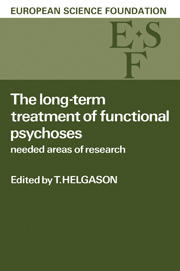Book contents
- Frontmatter
- Contents
- List of Participants
- Introduction
- I Organisational Aspects of Long-term Treatment
- Classification of functional psychoses requiring long-term treatment
- Structural changes in psychiatric hospitals
- Alternatives to hospitals: a field of promises and of not-yet answered questions
- The closing ofmental hospitals in Italy and its impact on long-term treatment of functional psychoses
- Future developments in Italy
- Optimal duration of long-term treatment in functional psychoses
- II Patients Aspects of Long-term Treatment
- III Public Health Aspectsof Long-term Treatment
- Index
Alternatives to hospitals: a field of promises and of not-yet answered questions
from I - Organisational Aspects of Long-term Treatment
- Frontmatter
- Contents
- List of Participants
- Introduction
- I Organisational Aspects of Long-term Treatment
- Classification of functional psychoses requiring long-term treatment
- Structural changes in psychiatric hospitals
- Alternatives to hospitals: a field of promises and of not-yet answered questions
- The closing ofmental hospitals in Italy and its impact on long-term treatment of functional psychoses
- Future developments in Italy
- Optimal duration of long-term treatment in functional psychoses
- II Patients Aspects of Long-term Treatment
- III Public Health Aspectsof Long-term Treatment
- Index
Summary
The search for alternatives to hospitals for the care of mentally ill people is a concern shared by the industralized as well as the developing countries. In the former, this arises mainly because of the criticism of mental institutions that has grown stronger and stronger during the last decades. In the latter, it is because the organization of psychiatric care is still in its infancy and a policy must be chosen whether to utilize scarce resources in an attempt to build up an appropriate network of hospitals (and for which patients), or whether other, less expensive alternatives should be favoured. These might enable similar therapeutic goals to be reached. Since developing countries do not yet have the potential to carry out thorough evaluation projects, it might be assumed that they look at what is planned in the industrialized world in a search for guidelines to follow in their own planning. Thus, our responsibility in advocating different alternatives for the care of the mentally ill might have a much wider implication than would be assumed at first glance.
Finding alternatives to hospitals seems to be a major issue for policy makers, psychiatrists, and pressure groups of different kinds. The argument for less institutional care has often been put in a boasting, rhetorical way (and has appeared, sometimes, to be a goal in itself). Also, it is not always clear whether such a stress on alternatives is based on a common rationale or whether this apparently common goal conceals disparate values and interests. In view of a certain difficulty in disentangling different objectives, I feel that ‘alternatives to hospitals’ cannot be discussed in a meaningful way unless additional basic concepts are taken into account. In fact, before discussing alternatives, and eventially advocating any of their possible advantages, it is necessary to establish:
which kind of hospital could (or should) be substituted and
which kind of patient is referred to.
In addition to the above-mentioned issues, it is essential to consider the broader sociocultural context. By, sociocultural context’ I mean primarily such variables as the economic level of the country, and the level of development and comprehensiveness of systems of general health and social care. In addition variables such as values, attitudes, and level of education in the general population (which are more difficult to measure) should also be given serious consideration.
- Type
- Chapter
- Information
- The Long-Term Treatment of Functional PsychosesNeeded Areas of Research, pp. 25 - 38Publisher: Cambridge University PressPrint publication year: 1985

